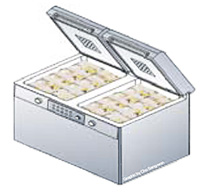- California Assembly OKs highest minimum wage in nation
- S. Korea unveils first graphic cigarette warnings
- US joins with South Korea, Japan in bid to deter North Korea
- LPGA golfer Chun In-gee finally back in action
- S. Korea won’t be top seed in final World Cup qualification round
- US men’s soccer misses 2nd straight Olympics
- US back on track in qualifying with 4-0 win over Guatemala
- High-intensity workout injuries spawn cottage industry
- CDC expands range of Zika mosquitoes into parts of Northeast
- Who knew? ‘The Walking Dead’ is helping families connect
Kimchi refrigerators keep cash hoards cool
By Kim Jae-won
A growing number of Koreans are using Kimchi refrigerators as an alternative to a safe in which to hoard their cash amid record low interest rates, a Bank of Korea (BOK) official said Thursday.
Those with cash to spare prefer kimchi refrigerators to traditional safes because the Korean kitchen coolers can contain more cash and keep hard currency at an appropriate temperature and humidity. A kimchi refrigerator can hold more than 1 billion won ($895,200) if filled with 50,000 won notes.
Cash hoarding is emerging as the latest trend for the rich as interest income from savings accounts has plunged amid record low interest rates.
“Rich people save their cash at home by putting it in a kimchi refrigerator as they expect little return from a bank due to low interest rates,” said Jang Min, a BOK director, in a luncheon meeting with reporters.
He said that it is hard for the central bank to exercise monetary policies to boost the economy if people do not use money by keeping it at home. Korea introduced the 50,000 won note in 2009, but there were soon suspicions that they were being used to create slush funds.
The comments came a week after the BOK froze its key interest rate at a record low of 1.5 percent for the eighth straight month since July 2015, referring to increasing volatility in the global economy. BOK Governor Lee Ju-yeol said that it was time to wait and see how turbulence will unfold in the markets rather than cutting the interest rate.
Stock markets have tumbled across the world since earlier this year largely due to worries over a slowdown in the Chinese economy and low oil prices, driving investors to move to safer assets, such as the U.S. dollar, Japanese yen and gold.
In Europe, European Central Bank (ECB) President Mario Draghi said earlier this month that the bank was considering doing away with the 500 euro bill amid concerns over its use by criminals. But market watchers see such a move as a first step toward the abolition of cash, which could make it easier for the ECB to cut rates further below zero.
“There is a pervasive and increasing conviction in the world of public opinion that high denomination banknotes are used for criminal purposes … It’s in this context that we are considering action,” he said in response to a journalist’s question about the future of Europe’s highest denomination bill.
















